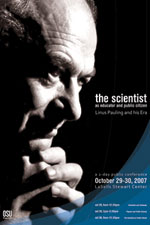Abstracts
Session 1: Scientists and Textbooks
October 29, 2007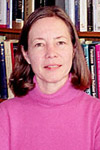
Session Chair, "Scientists and Textbooks” Watch Video
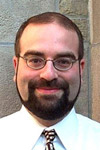
“Periodicity, Priority, Pedagogy: Mendeleev and Lothar Meyer” Watch Video
The priority dispute over the periodic system of chemical elements between D. I. Mendeleev (1834-1907) and Lothar Meyer (1830-1895) was one of the most vehement and high-profile of a series of nineteenth-century confrontations that quickly reduced to chauvinistic nationalist claims by proponents of both sides. Less often recognized is that both periodic systems had their origins in general chemistry textbooks written by each chemist -- The Principles of Chemistry and Modern Theories of Chemistry, respectively -- and that many of the subtle differences between the two systems, and thus pivotal points in the priority dispute, can be traced specifically to this textbook origin. This paper will explore the grounding of both systems in specific pedagogical systems, and discuss how questions of credit played out in the multiple genres of this priority dispute."
Related Names: Dmitri Mendeleev, Lothar Meyer
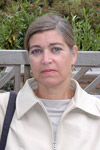
“Textbooks as Manifestos: C. A. Coulson after Linus Pauling and R. S. Mulliken” Watch Video
In this talk, rather than looking at Pauling’s The Nature of the Chemical Bond (1939) and Coulson’s Valence (1952) as manifestos in which the status of quantum chemistry was discussed, I look at both textbooks as manifestos for particular and distinctive epistemological views on science. In order to do that, I invite you to look at Coulson’s Valence not as the textbook which ended the hegemonic reign of Pauling’s The Nature of the Chemical Bond, but as the outcome of an on-going conversation, either literal or metaphorical, between Pauling and Coulson, in which each scientist qua author was responding to the other, agreeing or disagreeing with him, in the process revising his ideas, and writing his textbooks as a result of an enduring dialogue which did not stop with Valence nor even with the last edition of The Nature of the Chemical Bond. Seen from this new perspective, Valence was the textbook "neither Mulliken nor Pauling managed to write", and this realization is at the core of contrasting Pauling and Coulson’s epistemological views on science.
Related Names: Charles Coulson, Robert Mulliken
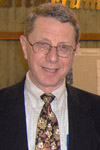
“Making a Modern Physics Textbook: The Collision of Full-Time Commitments” Watch Video
Without intending to do so, in 1978 I began a second career as a textbook author, which has now seen the production of a total of 5 editions of 3 undergraduate or graduate physics textbooks. This process has taken place more-or-less continuously over the past 29 years, during which time I have maintained an active program of research in nuclear physics as well as spending half my career as department chair. I will discuss the difficulties of balancing these (and other) time commitments, the appeal that draws me into textbook writing, and the unexpected benefits of joining the national physics education community. I will also offer some comments about physics textbooks from the varying perspectives of student, instructor, author, and publisher.
Session 2: Popular and Public Science
October 29, 2007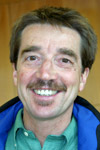
Session Chair, "Popular and Public Science” Watch Video
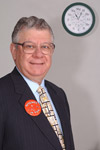
“On Bonding with the Public” Watch Video
Through demonstration and discussion, Dr. Shakhashiri attempts to underscore the relationship between the public and the scientific community. He addresses the role of science in modern life and explores ways in which scientific literacy can be increased. Dr. Shakhashiri engages his audience through a series of striking chemical reactions, illustrating both the need for, and possibility of, communication between the public and academic spheres. At the heart of Shakashiri's talk is the firm conviction that "science is fun!"
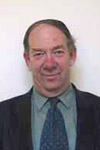
“Circa 1951: Presenting Science to the British Public” Watch Video
My theme is the Festival of Britain and its Exhibition of Science; and the Science Museum, which was still recovering after the War. Their approaches were fundamentally different. What was ironic was that the Festival exhibition was held on the site of, but not in, the Science Museum, the latter benefiting in the long term by getting the Festival's building. Some interesting characters were involved, Max Born, Jacob Bronowski and Frank Sherwood Taylor amongst them. Winston Churchill looked on critically at the whole Festival phenomenon, believing it to be purely political in intent.
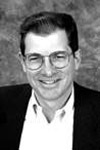
“Bringing Chemistry to Prime Time” Watch Video
Few sciences have had more impact on the way people live than chemistry – yet few have been so thoroughly ignored by the popular media. While countless primetime documentaries have been produced on archaeology, astronomy, biology, earth science, engineering, physics and other sciences, only a handful have been made about chemistry. In this talk, a longtime producer of public television science programs examines why chemistry is The Neglected Science – and explores what producers, television executives, funders and chemists can do to bring more chemistry to Prime Time. Includes a clip from Lyons’ most recent documentary, “Forgotten Genius,” NOVA’s two-hour profile of the late African American chemist Percy Julian.
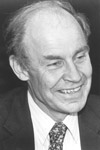
“Linus Pauling as an Evangelical Chemist” Watch Video
The great impact of Linus Pauling, on 20th century chemistry and molecular biology and in his campaign against atmospheric testing of nuclear weapons, was much enhanced by his skill, verve, and evangelical flair as a writer and speaker. This talk will emphasize aspects that ought to be emulated today in efforts to foster both more effective science education and public understanding and appreciation of science. Chief sources for my remarks are personal encounters with Pauling and stories heard from my Ph.D. mentor, E. Bright Wilson, who was one of Pauling’s early graduate students and coauthor of their classic text, Introduction to Quantum Mechanics. These provide a basis for speculating about what Linus might do with cyber-communication at his command!
Session 3: The Scientist as Public Citizen
October 30, 2007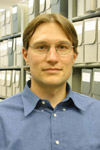
Session Chair, "The Scientist as Public Citizen” Watch Video
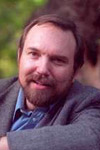
“The Scientist as Celebrity: Pauling, The Media, and the Bomb” Watch Video
I will review how Pauling achieved his status as one of the most visible anti-Bomb activists of the era, not only because of his scientific analyses (which were sometimes flawed) but through his ability to use the media effectively. This would cover especially his TV appearances, speeches, use of public hearings, and publicity surrounding the petitions -- as well as touching on the downsides of negative publicity and his relatively fruitless efforts spent pursuing libel suits (illustrating that public recognition carries risks as well as benefits).
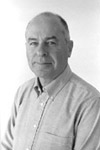
“Science in the McCarthy Period: Training Ground for Scientists as Public Citizens” Watch Video
Demagoguery functions much like a preemptive strike: "Flag wavers" paint those who may be effective opponents as unpatriotic. This occurred during the period 1945-1960, as Joseph McCarthy and others stirred fears of Communist influence in the United States. At first lauded for their creation of the atomic bomb and other World War II activities, scientists increasingly were criticized for their international orientation and left-leaning politics. American scientists were sometimes denied passports, foreign scientists were often deprived of visas, barriers were erected to prevent the exchange of information, jobs were lost. But scientists fought back, occasionally changing policy or at least embarrassing officialdom. Such efforts reinvigorated a flagging sense of the need for political participation among scientists.
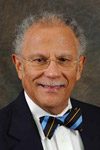
“The Evolution of Global Warming Science: From Ideas to Scientific Facts” Watch Video
Through his discussion of global warming, a major topic in current political and social discourse, Dr. Warren Washington addresses the role of the scientist outside of the academic world. His talk examines the positions of many modern scientists in terms of their political and ethical dialogue with their colleagues, with policymakers, and with the general public. Corresponding with his central topic, Dr. Washington offers current data regarding the phenomenon of global warming and its socio-political outgrowths. Washington also addresses Linus Pauling’s anti-war activism and compares it to current academic support for scientific and social awareness.
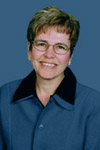
“Advocates for Science: The Role of Academic Environmental Scientists” Watch Video
Dr. Lubchenco uses her experience with marine biology and oceanic conservation to discuss the changing role of the scientist as public citizen. Through examination of the political and economic ramifications of humanity's impact upon our planetary ecology, Lubchenco illustrates the development of positions within the scientific community on matters of global importance. She explores the tensions felt by scientists and discusses the various factors that spur researchers to step out of the academic sphere and into the public conscience. Dr. Lubchenco also attempts to define, in this age of technology, the point at which science and ethics collide.
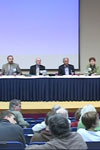
“Panel Discussion of Session III Topics” Watch Video
Tom Hager, Lawrence Badash, Warren Washington and Jane Lubchenco address questions presented by the public. The panel discussion revolves around problems of scientific involvement in current ecological issues. The speakers attempt to explore public and commercial interests related to contemporary environmental debates. They also speak on the role that scientists have historically filled in such discussions as well as modern changes to the traditional status of academics.


